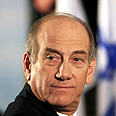
PM to ministers: Don’t respond to Abbas' speech
Israel aware of Palestinian president's growing distress, decides not to interfere. Olmert asks ministers to remain silent for fear Israeli statement will weaken Abbas
Throughout the evening, several diplomatic sources close to Olmert said that the speech was a positive development. They added, however, that it was still to early to talk, as similar statements have been made before without any outcomes.
The same sources claimed that Abbas' remarks prove his willingness to advance toward a possibility of negotiations with Israel. They suggested, however, that Israel wait for practical moves.
A security source close to Defense Minister Amir Peretz said in light of Abbas' declaration that "this is an important internal decision by the Palestinians which creates a new chance to renounce terror."
The source added that "this may make it possible to return to the negotiation table and create a new reality in the region."
Immediately afterwards, after consulting his diplomatic advisors, the prime minister instructed the ministers not to address the issue. Olmert seeks to prevent the internal Palestinian move from being thwarted or prevent a possibility of Israel getting involved in processes it has nothing to do with.
Such remarks have in the past disrupted Palestinian moves by Abbas and his supporters. In any case, Hamas accuses Abbas of cooperating with Israel, and any Israeli remark in favor of him only weakens him among the Palestinians.
'Israel should remain an observer'
Government Secretary Israel Maimon called the ministers over the weekend and instructed them not to discuss the issue. One of them told Ynet it was a very important instruction issued by the prime ministers, which would enable Israel to remain an observer on the process.
"Israel should see how things develop in the Palestinian Authority. Not everything depends on Abu Mazen (Abbas). We have already seen unexpected developments in the past," he said.
Abbas said in his speech that "according to the Palestinian law, the government is supposed to assist the president, not to contradict him. There are not two centers of power. Just like I appointed the government, I can oust it, and this is my completel legal right."
Nonetheless, Abbas left a loophole for Hamas: He stated that he would meet with the election committee to decide upon a new date for the elections, but refrained from suggested one, saying that the best solution would still be a technocratic government established by agreement between Hamas and Fatah.
The speech led to mass demonstrations in the Gaza Strip, which turned into exchanges of fire in several places between Hamas and Fatah members. At least 18 people were injured in the clashes.
The weekly cabinet meeting is scheduled to take place Sunday morning, and Olmert is expected to update the ministers on his trips to Berlin and Rome last week. He also expected to note his satisfaction over the growing international pressure on the Hamas-led government, which will be joined by Germany – the next European Union president – and Italy.
Olmert estimates that the EU countries and the US will continue to back Israel's moves, claiming that Hamas meets the Quartet conditions. According to these conditions, the Palestinian Authority must recognize Israel, renounce terror and acknowledge all the agreements it signed with Israel.










